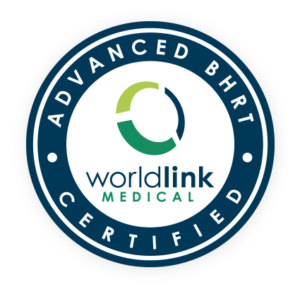Menopause that occurs naturally—rather than caused by surgery or a medical condition—is a part of the aging process for virtually all women. Marked by symptoms such as hot flashes, night sweats, mood swings, and vaginal dryness, menopause involves hormonal changes that develop gradually during 3 stages: perimenopause, menopause, and post-menopause. Nuestra Vida Well Living offers bioidentical hormone replacement therapy (BHRT) to help alleviate symptoms associated with menopause.
Most women experience some symptoms of menopause that can range in severity and duration. Fleeting, intense sensations of heat called hot flashes—often followed by sweating and chills—are the most common symptoms associated with menopause.
As you enter perimenopause, you may notice:
• Worsening of premenstrual syndrome (PMS)
• Breast tenderness
• Irregular periods or skipping periods
• Periods that are heavier or lighter than usual
•Hot flashes, chills, and night sweats often begin as you transition into menopause. At this stage, you may also experience:
• Vaginal dryness and discomfort during sex
• Urinary frequency or urgency
• Insomnia
• Emotional changes (mood swings, irritability, mild depression)
• Dry skin, dry eyes, or dry mouth
• Post-menopausal women often see a decrease in the severity and duration of these symptoms.
Menopause is caused by significant hormonal changes that usually begin after age 50 and last several years. The ovaries—the reproductive glands that produce estradiol, progesterone, and testosterone—stop producing high levels of hormones. Because the woman is no longer in the childbearing stage of life, hormone production drops, and ovulation and menstruation cease.
Women experience a range of symptoms starting with perimenopause and sometimes lasting through post-menopause—a time frame that may encompass nearly a decade.
• Perimenopause
This transition stage may emerge 8 to 10 years before the onset of menopause, often starting when a woman is in her 40s. The gradual reduction in estrogen production that signals perimenopause accelerates as a woman nears menopause. Because women continue experiencing menstrual cycles during perimenopause, they can still become pregnant. The average length of perimenopause is about 4 years, but for some women it may only last a few months.
• Menopause:
A woman enters menopause when she stops having menstrual periods and that continues for 12 consecutive months. That signals that the ovaries are no longer releasing eggs and the production of estrogen has dropped significantly.
• Postmenopausal:
The time after a woman has not had a menstrual period for a year is referred to as post-menopause and is often accompanied by reduced menopause symptoms. Some women, however, continue experiencing hot flashes and other symptoms for several years after menopause. Hormone levels remain low and the imbalance increases the risk of certain medical conditions, including osteoporosis and heart disease.
